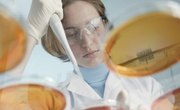Obtaining a doctorate degree in nutrition can prepare you for a career as a college professor, expert nutritionist or even an expert dietitian. Nutrition is an ever-changing field that is affected by the constantly changing nature of biological science and nutritional science. If you wish to obtain a doctorate in this field, you must have a desire to engage in extensive research and contribute to the existing scientific literature in the field.
Obtain your bachelor's degree in the field of nutrition, dietetics or a related field like anatomy and physiology or biological science. Schools that offer undergraduate degrees in nutrition tend to offer a Bachelor of Science degree. These degrees typically take four years to complete and include a wide variety of courses in biology, chemistry and nutritional science. Some schools offering undergraduate degrees in this field include the University of Pittsburgh, East Carolina University, the University of Delaware, Pepperdine University and Penn State University.
Conduct research into the field of nutrition to determine which areas of scholarship are in need of additional research. Finding a sub-field in the field of nutrition in which there are many questions yet to be answered can provide you with more opportunities to get into a graduate degree program and obtain employment later.
Apply for admissions to graduate degree programs in nutrition at both the master's degree and doctorate degree levels. Contrary to popular opinion, a master's degree is not always a stepping stone to a doctorate degree. Some doctorate degree programs will accept you without requiring you to have a master's degree. This will largely depend upon the program, your scores on the GRE (Graduate Record Exam), your undergraduate grade point average and the area you intend to conduct your research. When you apply for admission to these graduate degree programs, emphasize your research strengths and interests in your letter of intent. Schools offering master's degrees in this area include Kansas State University, Oklahoma State University, Tufts University and Eastern Michigan University. Doctoral programs are offered at schools like Emory University, Tufts University, Penn State University and the University of Kansas.
Complete your graduate degree coursework. During your first or two of study you can expect to complete your coursework in the field that is necessary for a broad understanding of the nutrition field and the major areas of research in the field.
Pass your comprehensive examinations and complete your dissertation. Most Ph.D. programs require you to complete written comprehensive examinations which can test your knowledge of nearly any area of nutritional science. Some schools may also require an oral examination. Once your exams have been completed, you can then proceed to complete your dissertation. The dissertation is designed to be an original piece of research that contributes new knowledge to the field of nutrition. This is typically a book-length project that is intended to be published later. Once your dissertation has been written, you may be required to defend your research in front of a panel of faculty members before you can acquire your doctorate.
Related Articles
References
Writer Bio
Jared Lewis is a professor of history, philosophy and the humanities. He has taught various courses in these fields since 2001. A former licensed financial adviser, he now works as a writer and has published numerous articles on education and business. He holds a bachelor's degree in history, a master's degree in theology and has completed doctoral work in American history.











